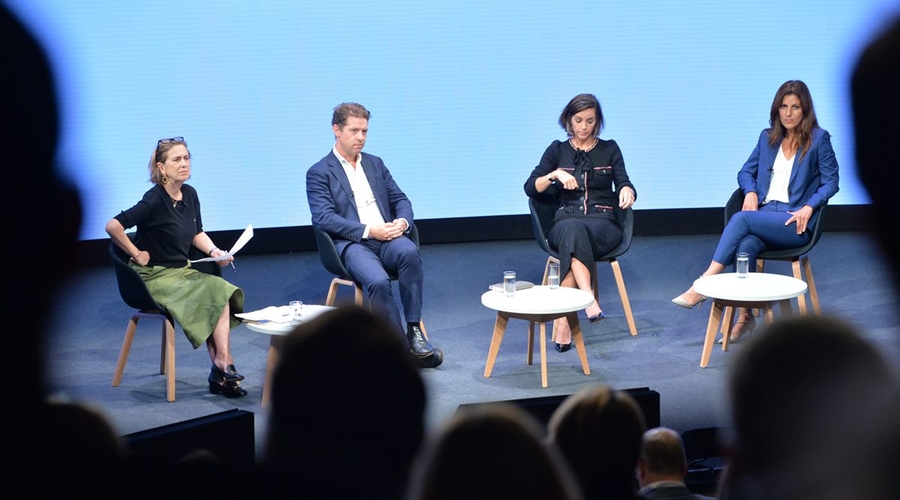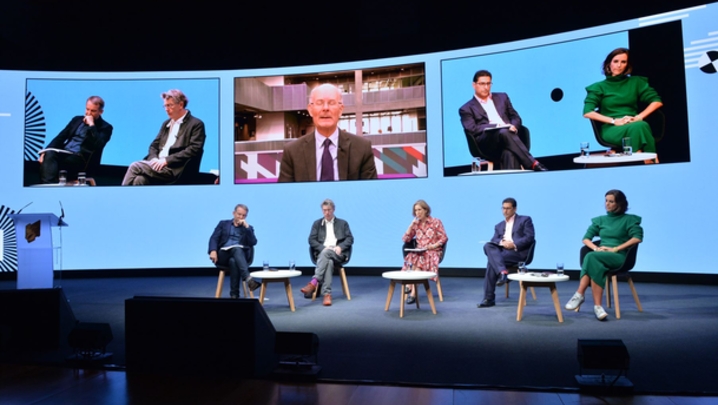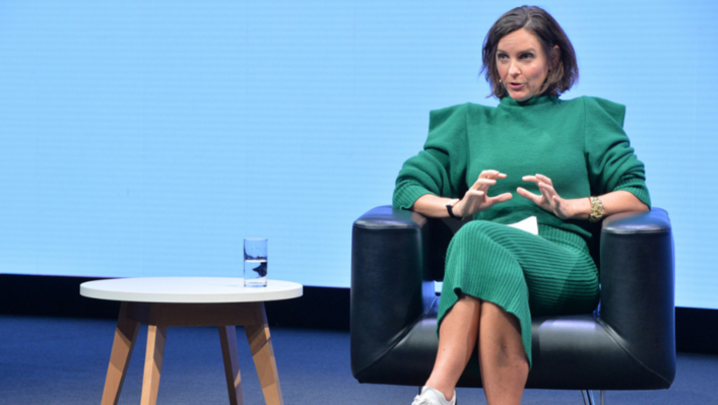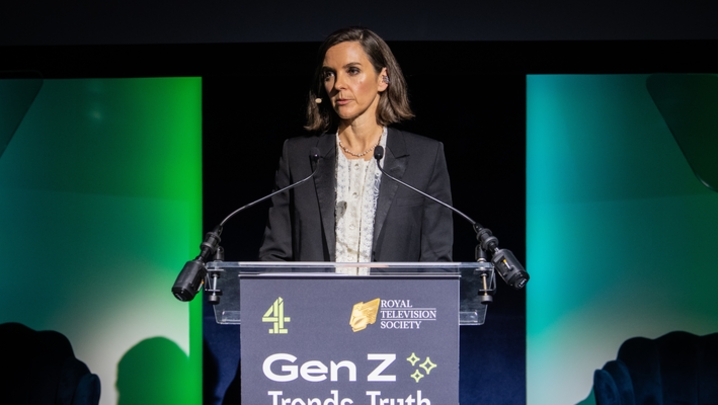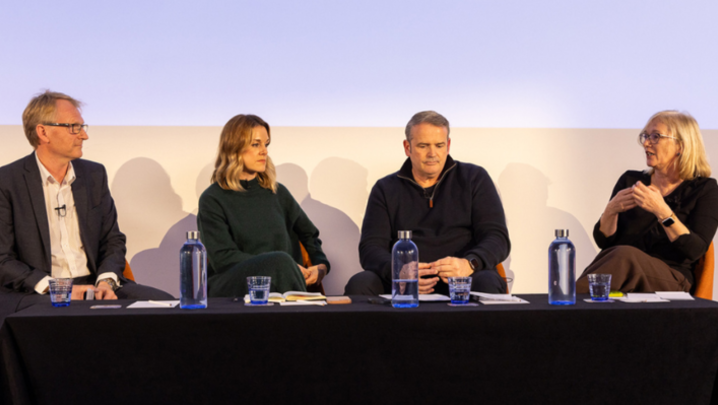How radically do public service broadcasters need to transform themselves in order to retain their traditional values?
Footage of John Cleese’s famous all-star 1985 BBC licence fee advert – in which he adapts the “What have the Romans ever done for us?” scene from Monty Python’s Life of Brian to show how much the corporation provides – kicked off this session on public service broadcasting. Former BBC Director-General and New York Times CEO Mark Thompson said many of the reasons that Cleese listed for paying the licence fee still felt “very true today”.
But in a lively, engaged debate, chair Kirsty Wark drew out the challenges facing the public service broadcasters over the next decade.
Thompson said there were two key issues: the arrival of competition from global streamers and the legacy effect of Alan Peacock’s 1986 report into financing the BBC, which lingered in the minds of ministers.
Despite John Whittingdale’s keynote speech at the RTS Convention the previous day, which talked about “extending the remit of the public broadcasters to ensure Britishness”, Thompson feared that the Government wanted “the ends of public service broadcasting but isn’t willing to wish the means”.
He went on to argue that, in the same way as the NHS was recognised as essential, so is the BBC in terms of airing “accurate, impartial information of every kind, as well as educational and great British entertainment. British stories for British audiences – that’s a real need at home and also potentially a world-beating growth industry for the UK, and it projects the UK around the world.”
Channel 4 CEO Alex Mahon said that, while the quality of content on streamers “is outstanding…, it’s not British content from a British perspective.
“That doesn’t have to mean it’s parochial, it can be global, but it does have to be made from here by people from here who have that point of view and perspective on the world. That’s always hard to define but I think that, if we lost it, we’d be in a very, very dangerous position as a nation.”
‘Streamers have demonstrated there’s this cash geyser… available in subscriptions’
With the debate about the potential privatisation of Channel 4 swirling, ViacomCBS Networks’ Maria Kyriacou offered Channel 5 as a “real-world example” of a foreign-owned, UK public service broadcaster. She pointed out that, since being acquired by the US global streamer in 2014, “we’ve increased our investment in original production – up 40% in primetime. Now, over 80% of our prime-time hours are original content.”
She added: “We’ve exceeded all aspects of our PSB remit, including out of London… we see that as a route for our future.”
Spectator editor Fraser Nelson argued: “There are so many things the market can do well, in fact a lot better than the BBC.” He suggested that the cost per episode of BBC drama would be a “pale imitation” of streamers’ due to the economies of scale for a global operator. “I don’t think BBC drama is bad, I just don’t think anyone who relies on the taxpayer for funding is going to be able to come near these global giants, who are accessing this new stream of revenue from subscriptions.”
BBC director of policy Clare Sumner disagreed: “We’re not a pale imitation. We had 6.1 billion streams to iPlayer last year.”
Mahon said the strong UK PSB ecology meant that “the question is how can we do more globally with that and stop freaking out that Netflix has got all the money in the world. We still have programming that is really valuable in terms of global exports and which people really want to watch.”
Nelson said he was not anti-BBC but thought it would “be forever stymied if it’s relying on politicians to decide how much money it’s going to get. That is not a very sustainable situation, especially when the streamers have demonstrated there’s this cash geyser that is available in subscriptions.”
Claire Enders, from Enders Analysis, countered that around 35% of the population – many of whom are older and poorer – “have no wish to subscribe to anything” and that losing the licence fee would damage “the universality of experiences that are accessible to all”.
Thompson thought that the 10-year BBC Charter, “which was meant to insulate the BBC from political interference and from constant noise, is clearly breaking down – and that’s a bad thing. Governments shouldn’t be endlessly re-examining and reopening everything, because it… is dangerous to the political independence of the broadcasters.”
Looking to the future of PSBs, Wark said a key component could be “Kangaroo 2”, the idea of a single, global British PSB streaming service that was being discussed again. The first version was blocked by competition authorities in 2009 – a decision many thought allowed US streamers to gain a huge advantage in the market.
Thompson was BBC Director-General at the time but thought: “With current public policy where it is, [it] would be rejected again. In common with many European countries, the British authorities think small and think local.” By comparison, US regulators “think global”.
Although British shows appeared on streaming platforms, “the original production brands… disappear in the wash and people assume [a programme is made by] Netflix or Amazon. So, in the end, it’s bad for the British. We’re in danger of becoming wholesalers of talent to the world.”
‘The PSBs’ job is to grow new talent [and give] it the space to experiment’
Sumner said the blocking of Kangaroo was “a huge regulatory mistake” and that “one of the challenges for us is regulation… recognising we’re in a global digital marketplace”.
Kyriacou pointed out that what “we’ve learnt… is you do better commercially if you deliver British content to British audiences, because that’s what they want to watch. We’re taking that learning across as we commission for [new SVoD service] Paramount+.”
Asked about Channel 4’s ambitions, Mahon said: “Tim [Davie] already knows, because we’re in discussions with him, that we are grubby and available for partnering… there’s value in us doing things together – but watch this space.”
Big Talk Productions CEO Kenton Allen told the panel that, although Amazon Prime’s Lord of the Rings was bringing in half a billion pounds and Sky and others were opening or building studios, he couldn’t find enough production staff: “I don’t know who’s going to make all these shows, but I do know the public service broadcasters are fundamental to training the next generation of behind-the-camera talent.”
Allen added that the US streamers all say they want Fleabag and Killing Eve, but they “were all sent them and they didn’t take them because they weren’t hits. So the pubic service broadcasters’ job is to grow this new talent [and give] them the space to experiment.”
He said talent wanted to be on global platforms, so “our job is to finance those shows to the best of our ability” with sophisticated co-production deals, such as on Big Talk’s The Offenders, where “20% of the money comes from the BBC, and the rest of it comes from Amazon and tax credits”.
Mahon agreed, adding that, when talent was established, it often went somewhere else but came back, as shown in Channel 4’s acclaimed care-home drama Help, “because the work’s so good, so it’s not always about budget”.
According to Thompson, the “central puzzle” for public service broadcasters was, “where’s the capital going to come from to transform the industry?”. Without it, the broadcasters would “end up landlocked as broadcasters, essentially, and landlocked in the UK”.
Session Fourteen: ‘Public service broadcasting: Facing failure or facing the future?’ featured Mark Thompson, CEO, Ancestry.com; Maria Kyriacou, President of ViacomCBS Networks for UK, Australia and Israel; Channel 4 CEO Alex Mahon; and Fraser Nelson, editor of The Spectator. The session was chaired by the broadcaster Kirsty Wark and produced by Adam Cumiskey. Report by Tara Conlan.

